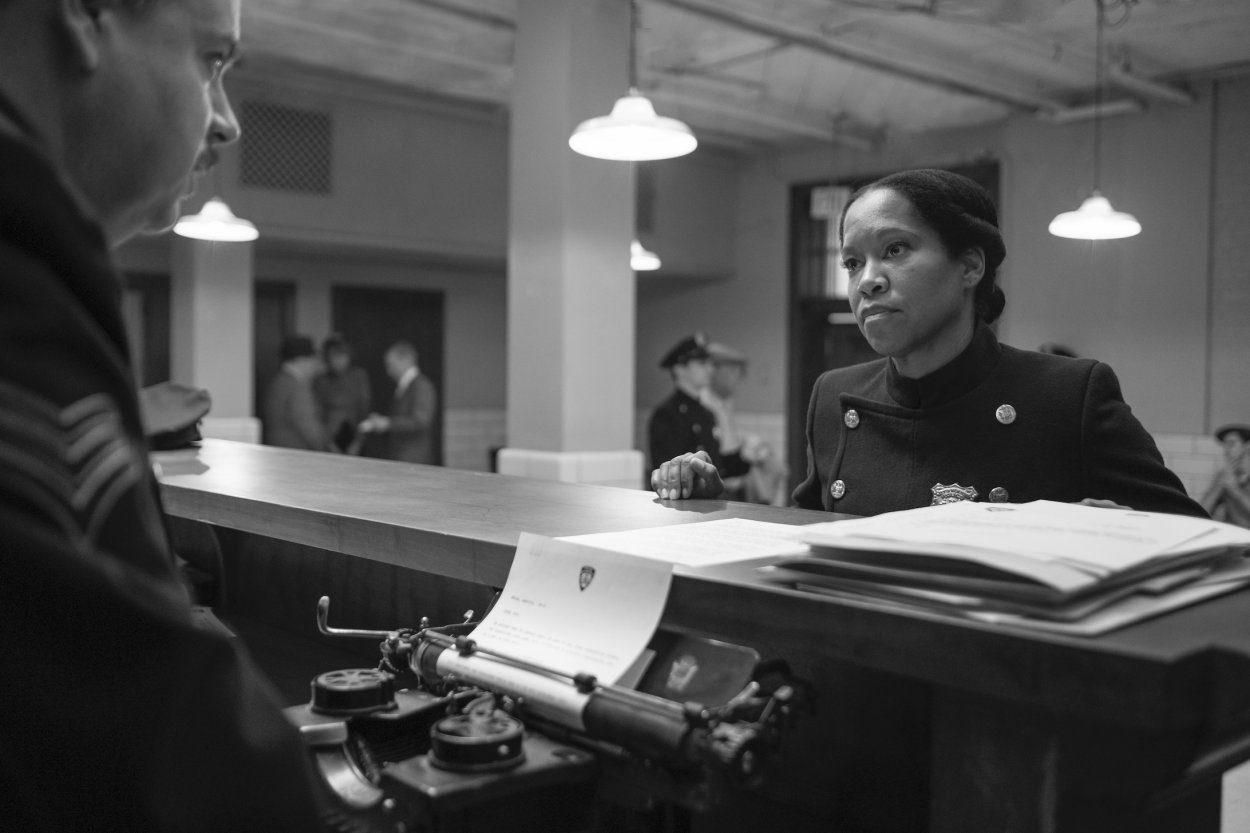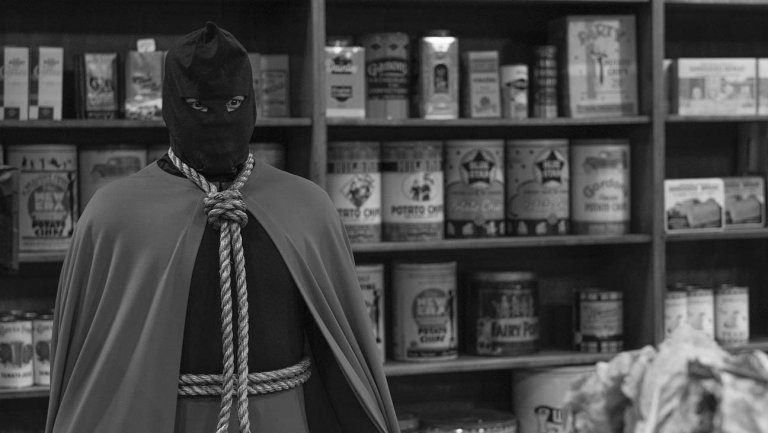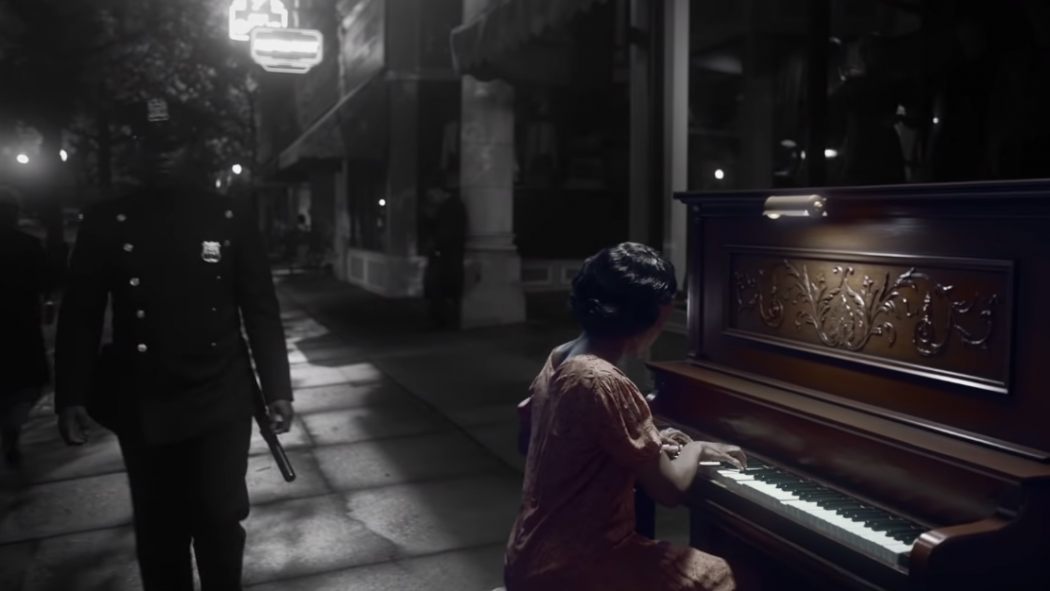The latest episode of Watchmen, “This Extraordinary Being,” finally pulls back the curtain on Will Reeves. At the conclusion to the previous episode, Angela downed Will’s entire bottle of Nostalgia–an outlawed drug tailored to an individual that helps them recall their memories. Most of this episode’s events are inside Angela’s mind as she experiences Will’s past firsthand.
The episode opens with an episode of American Hero Story, as Hooded Justice foils an attempted blackmailing by two detectives in an interrogation room. They know that he’s been sleeping with Captian Metropolis, the founder of the Minutemen. Hooded Justice quickly foils the caricatured cops with stylized violence, creating an effective schism between the slickness of this show-within-a-show and the reality of Hooded Justice’s career.
Throughout this episode, we learn why present day Will is kind of a dick: Angela sees through Will’s eyes that in most of his lifetime, you could count the number of people who genuinely treated him with kindness on one hand.
Even after the concussive opening scene in the pilot episode, Watchmen continues to refuse to pull punches in how it depicts the sickening prejudice in America. As badges are awarded, Will is passed over by his white peers so a black Lieutenant has to award the badge himself. The Lieutenant warned Will of something called The Cyclops. This is later revealed to be an extension of the KKK deeply embedded in Tulsa’s police force.

I really love the cinematography of this episode. The visual representation of Angela’s Nostalgia overdose is styled mostly as a single shot but filled with stealth cuts that shift between memories with a strange, dreamlike quality. This style continues through most of the episode, as scenes and settings bleed into each other and are punctuated by post-traumatic flashes of the Tulsa Massacre.
There’s an impactful and cruel moment in the episode in which Will arrests a white man who identifies himself as Fred for throwing a Molotov into a Jewish delicatessen. Fred is confident that his arrest will be short-lived. As Will brings Fred in, Fred throws out a racial slur. Will’s white coworkers defend him, but throw up an interesting hand gesture: the “okay” symbol pressed against the forehead. The booking officer immediately stands down. A short time later, Will runs into Fred on the street, realizing that he had somehow gotten off. This completely neutralizes what was thought to be a triumphant moment when Will’s white coworkers stood up for him; they were merely giving Fred a hard time for fun, and it’s revealed soon that they have no good intentions towards Will.
A popular theory surfaced early in the season involving Will being Hooded Justice, as eagle-eyed viewers noted similarities between the color schemes of the two. This is finally confirmed here in one of the most stylistically daring and disturbing scenes on television this year. The birth of Hooded Justice finds Will walking home. Some of his fellow officers pull up and offer him a ride. Will refuses several times, and the officers drive off, dragging the bodies of two black men behind their car. Will is intercepted by the officers and beaten senseless. The scene switches to the first person, as in one mostly fluid take, we are forced into Will’s perspective as he is very nearly lynched; they put the hood over his head, the noose around his neck, and string him up before cutting him down and delivering a racially-charged threat. Even after this violent, debilitating attack, Will finds the strength to defend a couple from a mugging, kicking off his career as Hooded Justice.

In one of the biggest revelations of the episode, Will (in costume as an officer) responds to a massacre at a screening of The Secret Life of Walter Mitty–itself an incredibly dreamlike film. The projector flickered and coerced a massacre among the African Americans in the audience. Like the squid in the original comics, this is an early and obvious telling of what will cause an explosion of violence in a later chapter.
We’re also shown that Will’s sexual relationship with Captain Metropolis is not just a product of American Hero Story. Will indeed had a relationship with Metropolis, and Metropolis had at least some of his own prejudice—he insists that Hooded Justice maintain his facade as a white man under the hood while in the presence of the other Minutemen, and refuses to help Will when Will discovers the headquarters of the Cyclops. This, of course, kicks off Will’s murderous rampage through their meat warehouse. Nearly every action Will takes in the latter half of this episode is one of violent, righteous retribution against hatred.
It takes that rejection from Metropolis for Will to realize that he can’t even rely on his vigilante team and his lover to take justice into his own hands. He encounters Fred outside the Cyclops headquarters and murders him. He proceeds to massacre the KKK personnel in the facility, and discovers that the Cyclops are using projection technology to violently turn African Americans against each other.

The penultimate scene shows that Will was indeed truthful when he claimed to Angela that he’s the one that hanged Judd. Well, at least partially true: he used the flickering light to hypnotize Judd into rolling his wheelchair towards the tree, and then to hang himself–which means that Will wasn’t technically lying when he said he was the one to hang Judd. For a moment, he pulls the light away and Judd returns to lucidity. Previously, Looking Glass inspected the KKK robes found in Judd’s closet and referred to them as “old-school,” indicating that they might not be Judd and could instead be some sort of heirloom. Judd confirms this (they belonged to his grandfather), and seems offended by the idea of being a racist. But he calls the robes his “legacy.” When asked why he hides it, Judd sneers, “You don’t know me, old man.”
I’ve maintained since the second episode that Judd is not the racist he’s suspected to be. This scene seems to confirm that, but it doesn’t entirely vindicate him either. His line “I’m trying to help you people” has a whiff of prejudice at the very least, and we still haven’t learned why he lied to his wife in the pilot about having one of his officers drive him to the hospital. We also don’t know how Will knew that Judd had the KKK robes in his closet. Even with learning that Will was indeed responsible for Judd’s death, there’s no context yet. Judd still has secrets, and his role in everything will most certainly be revealed in these final episodes.
Damon Lindelof has shaped this episode around trauma and terror, and as a result it’s one of the most impactful episodes of the series thus far. There’s less to unpack this time around in terms of series secrets, but there is an extraordinary amount of context given to Will’s character and, by extension, Angela. I expect this will form a backbone to Will’s motivations to whatever he’s plotting with Lady Trieu, and may eventually turn Angela to his cause as well.
I don’t necessarily think it’s coincidental that the show’s taken until now to introduce the existence of a mind-control light. Three episodes are remaining in the season, and the build to the climax will almost definitely involve mass hypnosis via this technology. Angela wakes up in Lady Trieu’s room, with a strange device strapped to her arm. Trieu will be an instrumental player in the final third of this season. Whether her intentions are nefarious or righteous (or, most likely, a combination of both), it will be the backbone of the finale of this terrific series.

